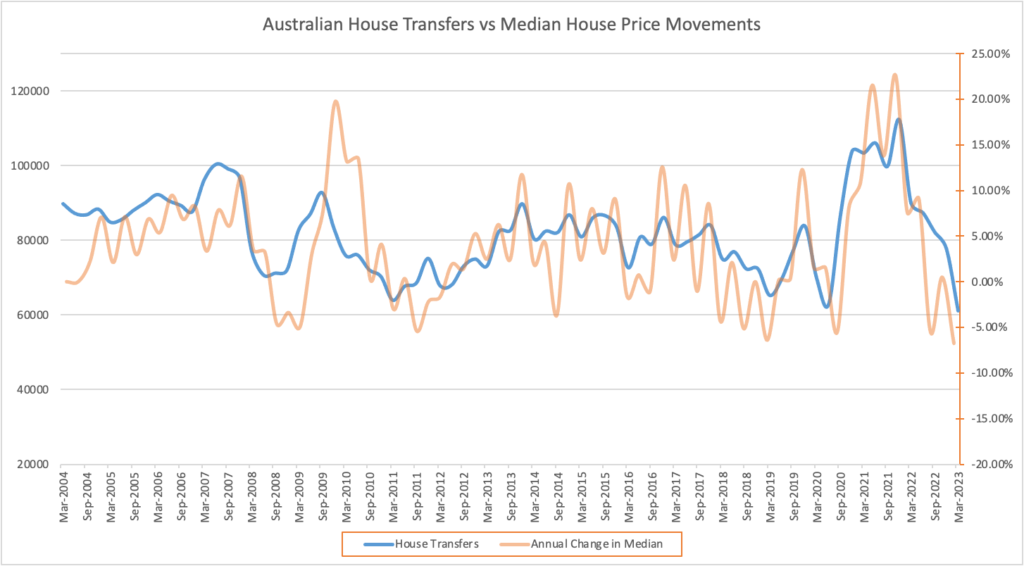The majority of property investors fail because they are unaware that they are following a herd that is running off a cliff.
Over the last 20 years, there have been three cyclical peaks in property transactions. These occurred:
- Mid-2007
- Late-2009
- Early-2022
The peak sales volumes in these periods signalled the peak of house price growth, and they immediately preceded property downturns. This trend is hard to deny when comparing the annual change in median house price with the quarterly housing transfer volumes.

Conversely, the periods which represent the lowest property transactions immediately preceded a boom in house prices. Those few people that got into the market during the GFC, in early 2012, and mid 2020, made the most money out of the market cycle as they captured every dollar of growth.
That’s why the early movers don’t stress when there is a correction at the end of the cycle: they have already made ample profit and they know that the subsequent reduction in transfers will bring great buying opportunities.
Smart investors recognise these patterns and get into the market as early in the cycle as they possible can. They know that they cannot “out-save” the market, so they buy what they can afford in order to take advantage of the market growth and avoid paying more for an inferior property later.
Where are we now?
Over the course of 2022 we saw property listings and transactions diminishing. This was largely driven by the uncertainty created as the RBA lifted interest rates and fed a steady stream of negative messages through the media to dampen consumer spending patterns.
When in doubt, people tend to sit on their hands. This leads to fewer sellers and fewer buyers. The result was a reduction in the median house price, which followed the trend of previous downturns.
Nonetheless, one thing that is different today from the last 20 years is that Australia is suffering one of the most acute housing shortages in the last 50 years.
Rents are rising rapidly, and many cities have vacancy rates at, or below, 1.00%. Economists and long-term investors consider a 3.00% vacancy rate to be a “balanced” market, so at 1.00% it is very much a landlord’s market. Homelessness is rising and share-housing is back in fad.
This has been driven by a backlog of housing and planning constraints at a time that we are seeing record population growth.
Smart investors saw these conditions emerging last year and got into the market.
Since January 2023, the median house price in Sydney has increased by more than 5%. This can partially be explained by an increase in the number of premium properties being listed and sold, but there are genuine price increases in many suburbs that are not classified as premium markets.
And Sydney isn’t the only market that has been moving. Perth and Brisbane are rapidly picking up pace. Given that they are more affordable than Sydney, with critical housing shortages and rapid population growth, the escalation in these markets is unsurprising.
Depending on the target market, investors have arguably missed out on as much as $70k of price growth since this market cycle commenced. That means, buyers today will either need to substitute for a cheaper property or pay more to get into the market. If you choose the latter, then you not only pay more for the property but, once you factor in $3.5k extra stamp duty and $60k additional compound interest on a larger loan, the long term impact of missing the start of the upswing can easily exceed $130k.
While it still has a way to run, given the undersupply, every month that passes means the growth cycle will be one month shorter and buyers waiting to act will pay more and see a diminishing return.
That is why smart investors know that the best time to buy property is as soon as they can afford to.









